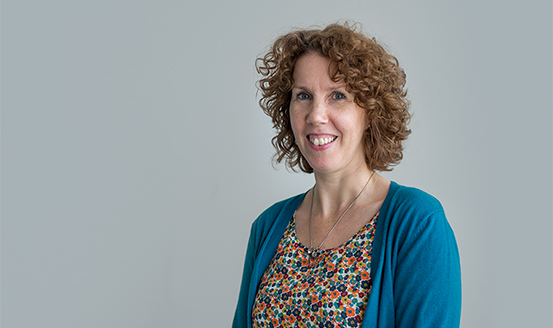School Nursing (Person-Centred Practice) - PgDip
School Nurses are autonomous practitioners working collaboratively with health, education and other agencies to uphold the rights of school age children and young people. Through health education, health promotion and addressing health inequalities they advocate for children and young people positively influencing their health and wellbeing. This PgDip in School Nursing (Person-Centred Practice) course is for Nursing and Midwifery Council (NMC) registered nurses and midwives who wish to work in the community as a school nurse.
The course is delivered full time over one year with a start date in January.
Why QMU?
- Specialist qualification: The course is Nursing and Midwifery Council (NMC) validated and leads to a Specialist Community Public Health Nursing (School Nursing) Qualification.
- Contemporary, creative and interactive learning approaches: The learning environment will generate an ethos of engagement where students can explore and challenge theories, practices and different sources of knowledge creatively in an atmosphere of high challenge and high support.
- Staff expertise and support: You will be taught by a team of academic staff who are passionate about working with children, young people and their families, and in facilitating learning with Specialist Community Public Health Nurses.
- Our reputation: We have a reputation at QMU for innovative curriculum design, being supportive and responsive to students and extensive online resources.
- Relevance: The programme is underpinned by person-centred philosophy and is consistent with the World Health Organisation (WHO) Framework of ‘people-centred healthcare’.
School Nursing (Person-Centred Practice) - PgDip: More information and what you will achieve
The course aims to enable students to become:
• dynamic person-centred leaders influencing positive outcomes for children, young people, their families, community and wider population; and
• autonomous, evidence informed practitioners who demonstrate deep critical thinking, professional resilience and competence.
How will I be taught?
Structure and exit awards
You will exit with a PgDip (120 credits) and entry to Level 3 of the Nursing and Midwifery Council (NMC) Professional Register for Nurses, Midwives with NMC registration: Specialist Community Public Health Nursing (SCPHN) – School Nursing. A PgCert is awarded to students who achieve at least 60 credits, but do not complete the full course.
You can also register as an associate student to complete a single module for CPD. You can apply to study the module Ethical Judgements and Decision Making. Contact Lynne Darling for more information on single module study.
Teaching, learning and assessment
The course offers a theory-to-practice ratio of 40% theory and 60% practice.
Students on the course have taught content alongside Health Visiting students and have the opportunity for shared learning through this.
Successful students will achieve is a Post-Graduate Diploma in School Nursing (Person-Centred Practice)
Person-centred practice philosophy is embedded in our teaching, learning and assessment strategies. The philosophy of persons, personhood and person-centredness where all persons are valued equally, creates an environment where students and teaching staff engage in mutual learning. Our approach is facilitative and consistent with the QMU Student Experience Strategy (2021-2026).
We create learning environments where all persons feel engaged and able to commit to humanist and transformational learning processes, both in the classroom and online. Facilitation of learning, critical thinking and reflexivity are central to the programme
Teaching across all 6 modules will take a blended strategy; a mixture of online and face-to-face teaching.
Modules will begin at the start of the Semester and will follow an approach where teaching takes place on a set day either once a week or once per fortnight. The core module content will be delivered with students from both the School Nursing and Health Visiting programmes facilitating shared learning experiences. Field specific seminars, offering students opportunities to enhance their comprehension of how theoretical perspectives and frameworks relate to their individual professional practice.
The course will use a variety of methods to facilitate student’s learning depending on the topic being taught. The blended learning mix will offer a variety of teaching and learning styes, course materials and learning technologies.
Assessment strategies will encourage application of theory to practice. A variety of formative and summative strategies which draw on the student's own area of practice will provide diversity. Assessment will be personally and academically challenging and will facilitate the application of reflective skills, critical analysis and reasoned decision making.
Placement
Practice learning is a central element to the course. As a professional programme, students are required to demonstrate they meet the NMC standards of proficiency for SCPHN School Nursing practice.
The course is approximately 60% practice-based and requires placement in an approved practice environment. To support students in their practice learning environment they will be assigned to Practice Supervisors (PS) and a Practice Assessor (PA). The PS, PA and an Academic Assessor support and assess student learning to meet the standards for student supervision and assessment (NMC 2023).
Placements will be allocated by the NHS health board area. There will be two practice learning periods within the course.
Teaching hours and attendance
The course is delivered over one year full-time or two years part-time. Holidays are fixed throughout the course (7 weeks in total) and spread throughout the year.
From week three of semester one you will begin your practice placement two days per week alongside university study days. Days in placement will gradually increase throughout the course. You will be in practice placement full time in semester three.
Class sizes
Class sizes will vary.
Teaching staff
You can read more about the teaching staff on this course at the bottom of this page. Please note that teaching staff is subject to change.
Modules
- Person Centred Approaches to SCPHN Practice (20 credits): This module will enable you to develop an understanding of person centred approaches, applied to the role of the Specialist Community Public Health Nurse School Nurse. You will explore the principles of personhood, person centred practice and salutogenesis to enable a robust foundation throughout the course modules and practice learning.
- Leading Public Health Priorities (20 credits): This module explores health priorities within the context of public health, from a global, national and local perspective. You will develop knowledge and understanding of social policy and challenges which influence health needs within demographics which are relevant to your field of practice. These health needs will be examined from the perspectives of epidemiology and sociology, to further enhance understanding of health inequalities within society. This knowledge will influence your role in facilitating and leading on the implementation of governmental health promotion strategies.
- The Child and Young Person in Situ (20 credits): This module explores the child and young person in their context, through their development, transitions, and the influences of the environment and wider communities on this. You will apply learning from theory and policy to your role as a Specialist Community Public Health Nurse and working collaboratively to demonstrate assessment and support for the child, young person and their families in their community.
- Ethical Judgements and Decision Making (20 credits): This module focuses on exploring ethical judgment and decision-making skills. You will explore and apply ethical principles in various contexts, developing the ability to analyse judgements and decisions while considering person-centred application and moral implications. Through participation in this module you will enhance your understanding of ethical reasoning and decision-making both for yourself and in understanding the choices of others.
- Resilience and Adaptability when working with Children and Young People (20 credits): This module will allow you as a School Nurse student the opportunity to discuss and explore the many aspects, influences, theories and professional challenges that arise when working with children, young people and their families within the context of vulnerability. Inequalities in health, child protection, safeguarding, risk and resilience are fundamental elements for the SCPHN professional to understand and apply theory to practice. Working in a strengths-based person-centred approach to manage risk and promote positive outcomes for children and young people.
- Evidencing SCPHN Practice (20 credits): This year long work-based learning module will enable you to undertake experiential practice, activities and learning in the practice learning environments. Evidence will be gathered throughout the programme that demonstrates your competence against the NMC (July 2022) SCPHN practice standards as you progress and transition to your professional role of School Nurse.
NB The modules listed are correct at time of posting (April 2024) but are subject to change. In the event that modules change, QMU will seek to use reasonable endeavours to ensure that there is no detrimental impact on students.
Career opportunities
Graduates have taken up Specialist Community Public Health Nurse (School Nursing) roles within NHS health board areas.
School Nursing (Person-Centred Practice) - PgDip: Entry requirements and application information
Entry requirements
Applicants will normally be UK honours graduates or equivalent.
At time of entry onto the course all applicants must be NMC Registered Nurses (Level 1) and/or Midwives.
Entry will be based on the following criteria:
Standard Entry
• If an applicant has obtained a relevant degree within the last 5 years at the time of applying, then this meets the academic criteria for Standard Entry to the course.
Non-standard Entry Options
Applications for non-standard entry will be assessed by the Programme Admissions Team to ensure consistency of decision making.
• If an applicant has obtained a degree more than 5 years ago at the time of applying but has successfully completed further academic study at Scottish level 11 or equivalent within the last 5 years, then this meets the criteria for Non-standard Entry to the course.
• If an applicant has obtained a degree more than 10 years ago but has completed Scottish level 11 study within the last 5 years then this meets the criteria for Non-standard Entry to the programme.
• If an applicant has no degree but has successfully completed other academic study at Scottish level 11 or equivalent within the last 5 years, this meets the criteria for Non-standard Entry to the course.
• If an applicant has obtained a degree or other academic study at Scottish level 11 or equivalent, more than 10 years ago, then a discussion with the programme leader is required prior to applying.
It may be appropriate for applicants without academic qualifications to be admitted initially as an associate student. Should they be successful in their first module as an associate student, they may then transfer to the full programme having successfully completed the shortlisting and interview process.
International: Applicants whose first language is not English, must provide evidence of English language proficiency. In line with the post graduate programmes in the Division of Nursing and Paramedic Science, the requirement is set at a standard equivalent to the British Council International English Language Testing Service (IELTS) at an aggregated grade of 6.5 (or equivalent) with no element of performance below 6.0.
Disability/health conditions
If you have a disability, long-term physical or mental health condition, or learning disability, it should not stand in the way of your studying at QMU. However, if you are not sure whether your disability might be a barrier in your studies or in relation to the professional standards, please contact the disability service who will be able to have a conversation with you about reasonable adjustments and supports available to you.
Applying for this course
All candidates apply through a relevant Health Board. Most students are Health Board funded however there is the opportunity to self-fund.
Monitor the NHS Jobs website or contact the relevant manager at your Health Board for more information.
You will be required to submit an application along with a 1500 admission essay to your NHS Health Board and on successful interview an application is made to QMU which will include providing a degree certificate/academic transcript/reference.
Application deadline
Health boards advertise locally and therefore application deadlines vary.
Start dates
There are intakes in either September or January each year. Partner NHS Health Boards normally advertise their recruitment opportunities around March – April for the September intakes, and Aug – Sept for the January intakes. Please note: there is no September 2024 entry for this course.
Terms and Conditions
The delivery of this course is subject to the terms and conditions set out in our 2024/25 Entry - Terms and Conditions (Postgraduate).
More information and QMU contacts
Contact Lynne Darling for more information on single module study (Programme Leader) or contact Admissions.
Opportunities to meet us
Become your best you: study at QMU
Course Overview
Useful Links
Join us at one of our Postgraduate Open Events
Find out about online and in-person opportunities to meet with us to find out more about our postgraduate courses and study at QMU.
Postgraduate Open Events - More Info and BookingsCourses You Might Also Like
- Independent and Supplementary Prescribing for Healthcare Professionals
- MSc Palliative Care (Person-Centred Practice)
- MSc/PgDip/PgCert Person-Centred Practice
- PgCert Advanced Forensic Practice (Person-Centred Practice)
- PgDip Advancing Care Home Practice (Person-Centred Practice)
- PgDip Health Visiting (Person-Centred Practice)







